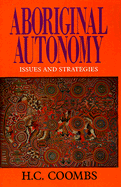Book contents
- Frontmatter
- Contents
- Foreword by Michael Dodson
- Preface
- Acknowledgments
- The Aboriginal World View
- Aborigines and the Land
- Aboriginal Lifestyles
- Aborigines, Resources and Development
- Aborigines, Law and the State
- 11 The Yirrkala proposals for the control of law and order
- 12 Aboriginal political leadership and the role of the National Aboriginal Conference
- 13 Aborigines and the Treaty of Waitangi
- Asserting Autonomy: Recent Aboriginal Initiatives
- The Recognition of Native Title
- Conclusion
- Appendix: The Eva Valley Statement
- References
- Select Bibliography of work by H.C. Coombs
- Index
13 - Aborigines and the Treaty of Waitangi
Published online by Cambridge University Press: 03 May 2011
- Frontmatter
- Contents
- Foreword by Michael Dodson
- Preface
- Acknowledgments
- The Aboriginal World View
- Aborigines and the Land
- Aboriginal Lifestyles
- Aborigines, Resources and Development
- Aborigines, Law and the State
- 11 The Yirrkala proposals for the control of law and order
- 12 Aboriginal political leadership and the role of the National Aboriginal Conference
- 13 Aborigines and the Treaty of Waitangi
- Asserting Autonomy: Recent Aboriginal Initiatives
- The Recognition of Native Title
- Conclusion
- Appendix: The Eva Valley Statement
- References
- Select Bibliography of work by H.C. Coombs
- Index
Summary
Originally presented as part of the Boyer Lecture Series by the Australian Broadcasting Corporation, 1988.
THE NEED FOR A TREATY
In June 1979 I spoke in an Australian Broadcasting Commission Guest of Honour series about the need for the Australian Government to negotiate a treaty with the Aboriginal people of Australia. I pointed out that until this was done, our occupancy of this land, our very right to be here, is tainted by the aggression against the Aborigines by which it was established. Since that time there have been important changes in public awareness of that treatment and the status of Aborigines in our society. Evidence accumulates that international opinion judges our performance to fall far short of civilised standards. A series of reports by internationally respected bodies, including the World Council of Churches and agencies of the United Nations, shames us before the world. Our name is linked with South Africa and other nations whose lack of respect for human rights is widely condemned. Such judgements could well lead to action, political and economic, seriously detrimental to our international standing. It is inconsistent with our dignity as a civilised people to wait for such pressure to be mobilised against us.
Within Australia there has been a growing awareness of the injustices inflicted upon Aborigines by our forebears and of our own failure to act effectively to correct them.
- Type
- Chapter
- Information
- Aboriginal AutonomyIssues and Strategies, pp. 143 - 154Publisher: Cambridge University PressPrint publication year: 1994



